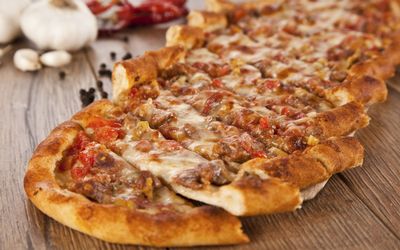IS GOOGLE taking over the kitchen? Are those shelves of cookbooks — the Jamie Olivers, the Nigella Lawsons, the Jenny Morisses and the Reuben Riffels — going the way of the cassette tape, the transistor radio and the typewriter? Obsolete, unwanted, a mere curiosity to be displayed in a future museum and talked about wistfully by older cooks?
As a user of cookbooks and a food columnist who writes and tries new recipes every week, I seem to move between (or at least fall between) two stools: dipping into books as well as Googling for ideas.
It recently dawned on me that I hardly ever pull down a cookbook any more. I google. And not just randomly — there are sites and sources I trust more than others, and some I avoid and distrust.
With Google, all that poring over indexes and flipping through pages is obviated. All you do is type in "garlic soup" and you get a world of recipes for precisely that. And you can pluck out your Nigella or Jenny, your Reuben or Jamie, if you want to.
Or even mash it up — take an idea from Jamie, add a soupcon of Nigella, spice it up a la Reuben, and finish it off with a dash of Jenny.
Which makes me wonder: which of the celebrity chefs are the most googled? Are lemons more googled than tomatoes? And do people look for Thai recipes more than Vietnamese, or French more than Italian?
Enter Mich Atagana, head of communications and public affairs for Google SA, who has these and other titbits at her fact-flipping fingertips.
For South African home cooks, says Atagana, Oliver wins hands down. "In fact, if you restrict the data to show you the trends during the past 12 months, Jamie is the only one with a significant enough number of searches to appear.
"However, when you widen the parameters to give you feedback on searches from 2004 (which is as far back as you can go) to the present, other chefs appear, namely Gordon Ramsay and Nigella Lawson.
"While Oliver is clearly the chef most searched, who follows, between Ramsay and Lawson, is a little less clear," she says.
"When looking at data for ‘Nigella Lawson’, it would seem that Ramsay is the second most googled chef.
"However, Lawson is generally referred to only as ‘Nigella’, so when you look at data for ‘Nigella’, she becomes the second most googled international celebrity chef."
The rest — and that’s all the rest — barely get a look-in.
Again, looking at data from 2004 to the present, other chefs do appear, but not nearly as significantly.
"First appearing in the data in January of 2011, the Barefoot Contessa had a small spike in searches, which has steadily decreased since then.
"Paul Hollywood also has a small showing, while Gino d’Acampo has not accrued enough searches to appear in the data."
Narrowing the data down to our own top chefs, two names head the list: Riffel and Morris "have been searched enough to appear in the results", Atagana says. "Of those two, Riffel is more consistently searched by South Africans."
As for international cuisine, if you thought Italian, French or Thai would be the obvious winners, you’d be wrong. For South Africans, one cuisine is king: Indian.
"When it comes to what types of international cuisine South Africans are googling the most, the data is very clear. By a massive margin, ‘Indian food’ is far more heavily searched than Thai, French or even Italian food."
No surprises, though, when you compare searches for meat or vegetable dishes for meat-loving South Africans. More specifically, it’s chicken that is the most googled in SA.
"By far, South Africans are always interested in finding chicken recipes, followed by beef, lamb and then vegetarian recipes. However, South Africans do search for vegetarian recipes more than they search for seafood recipes."
When it comes to related searches, for beef, it’s stew we look for, for lamb it’s chops, and for seafood, it’s seafood pasta. But for chicken, it’s just "recipes for/with chicken".
As for the influence of Tim Noakes, his Banting diet is the food topic that has most obsessed us during the past 12 months.
"Looking at searches related to recipes in the past 12 months, searches for ‘Banting recipes’ have increased 350%. Searches for ‘Banting diet’ have increased 200%, and searches for ‘Banting diet recipes’ have increased 180%."
Compare this with 2004, when the most popular food-related search was simply "easy recipes". Atagana argues that this perhaps answers my question as to whether people are using their devices more than cookbooks.
"That people are interested in ‘easy recipes’ would say to me that perhaps the people who are using their devices when it comes to cooking are relying solely on their devices," she says, as opposed to the more complex recipes many cookery books deal in.
And every year since 2004, Atagana says, December is the month when SA and the world use Google the most to find festive recipes or some pointers as to what to fling on the braai or make for a summer party.
But the Google-searching world is not wholly obsessed with celebrities, she adds.
"Yes, YouTube and Google tools can teach you to make traditional Western dishes like beef Bourguignon, but there’s also a wealth of content from Africa sharing how to make a tasty Kenyan dish or a popular Nigerian snack. You can explore some of Africa’s culinary wonderland, using your phone to find recipes, and see how easy these dishes are to make."
Having said all that, the scores of cookbooks on my kitchen shelves are not going anywhere.
Because, as you read this, publishing houses are pushing out new books by the likes of Jamie, Nigella, Reuben and our Giggling Gourmet because of one proven fact: cookbooks sell. So we must still be buying them.

Googling recipes is common practice and South Africans have become more specific about their online searches, with Indian food topping the list. Picture: ISTOCK
IS GOOGLE taking over the kitchen? Are those shelves of cookbooks — the Jamie Olivers, the Nigella Lawsons, the Jenny Morisses and the Reuben Riffels — going the way of the cassette tape, the transistor radio and the typewriter? Obsolete, unwanted, a mere curiosity to be displayed in a future museum and talked about wistfully by older cooks?
As a user of cookbooks and a food columnist who writes and tries new recipes every week, I seem to move between (or at least fall between) two stools: dipping into books as well as Googling for ideas.
It recently dawned on me that I hardly ever pull down a cookbook any more. I google. And not just randomly — there are sites and sources I trust more than others, and some I avoid and distrust.
With Google, all that poring over indexes and flipping through pages is obviated. All you do is type in "garlic soup" and you get a world of recipes for precisely that. And you can pluck out your Nigella or Jenny, your Reuben or Jamie, if you want to.
Or even mash it up — take an idea from Jamie, add a soupcon of Nigella, spice it up a la Reuben, and finish it off with a dash of Jenny.
Which makes me wonder: which of the celebrity chefs are the most googled? Are lemons more googled than tomatoes? And do people look for Thai recipes more than Vietnamese, or French more than Italian?
Enter Mich Atagana, head of communications and public affairs for Google SA, who has these and other titbits at her fact-flipping fingertips.
For South African home cooks, says Atagana, Oliver wins hands down. "In fact, if you restrict the data to show you the trends during the past 12 months, Jamie is the only one with a significant enough number of searches to appear.
"However, when you widen the parameters to give you feedback on searches from 2004 (which is as far back as you can go) to the present, other chefs appear, namely Gordon Ramsay and Nigella Lawson.
"While Oliver is clearly the chef most searched, who follows, between Ramsay and Lawson, is a little less clear," she says.
"When looking at data for ‘Nigella Lawson’, it would seem that Ramsay is the second most googled chef.
"However, Lawson is generally referred to only as ‘Nigella’, so when you look at data for ‘Nigella’, she becomes the second most googled international celebrity chef."
The rest — and that’s all the rest — barely get a look-in.
Again, looking at data from 2004 to the present, other chefs do appear, but not nearly as significantly.
"First appearing in the data in January of 2011, the Barefoot Contessa had a small spike in searches, which has steadily decreased since then.
"Paul Hollywood also has a small showing, while Gino d’Acampo has not accrued enough searches to appear in the data."
Narrowing the data down to our own top chefs, two names head the list: Riffel and Morris "have been searched enough to appear in the results", Atagana says. "Of those two, Riffel is more consistently searched by South Africans."
As for international cuisine, if you thought Italian, French or Thai would be the obvious winners, you’d be wrong. For South Africans, one cuisine is king: Indian.
"When it comes to what types of international cuisine South Africans are googling the most, the data is very clear. By a massive margin, ‘Indian food’ is far more heavily searched than Thai, French or even Italian food."
No surprises, though, when you compare searches for meat or vegetable dishes for meat-loving South Africans. More specifically, it’s chicken that is the most googled in SA.
"By far, South Africans are always interested in finding chicken recipes, followed by beef, lamb and then vegetarian recipes. However, South Africans do search for vegetarian recipes more than they search for seafood recipes."
When it comes to related searches, for beef, it’s stew we look for, for lamb it’s chops, and for seafood, it’s seafood pasta. But for chicken, it’s just "recipes for/with chicken".
As for the influence of Tim Noakes, his Banting diet is the food topic that has most obsessed us during the past 12 months.
"Looking at searches related to recipes in the past 12 months, searches for ‘Banting recipes’ have increased 350%. Searches for ‘Banting diet’ have increased 200%, and searches for ‘Banting diet recipes’ have increased 180%."
Compare this with 2004, when the most popular food-related search was simply "easy recipes". Atagana argues that this perhaps answers my question as to whether people are using their devices more than cookbooks.
"That people are interested in ‘easy recipes’ would say to me that perhaps the people who are using their devices when it comes to cooking are relying solely on their devices," she says, as opposed to the more complex recipes many cookery books deal in.
And every year since 2004, Atagana says, December is the month when SA and the world use Google the most to find festive recipes or some pointers as to what to fling on the braai or make for a summer party.
But the Google-searching world is not wholly obsessed with celebrities, she adds.
"Yes, YouTube and Google tools can teach you to make traditional Western dishes like beef Bourguignon, but there’s also a wealth of content from Africa sharing how to make a tasty Kenyan dish or a popular Nigerian snack. You can explore some of Africa’s culinary wonderland, using your phone to find recipes, and see how easy these dishes are to make."
Having said all that, the scores of cookbooks on my kitchen shelves are not going anywhere.
Because, as you read this, publishing houses are pushing out new books by the likes of Jamie, Nigella, Reuben and our Giggling Gourmet because of one proven fact: cookbooks sell. So we must still be buying them.




















Change: 1.61%
Change: 1.50%
Change: 1.82%
Change: 0.74%
Change: 4.50%
Data supplied by Profile Data
Change: -0.26%
Change: -0.04%
Change: 1.61%
Change: 0.00%
Change: -0.06%
Data supplied by Profile Data
Change: 0.67%
Change: 0.83%
Change: 0.87%
Change: 0.15%
Change: 1.03%
Data supplied by Profile Data
Change: 1.12%
Change: 1.39%
Change: 1.27%
Change: 4.65%
Change: -1.57%
Data supplied by Profile Data